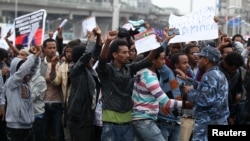A state-backed news agency in Ethiopia reports that about 2,000 people detained during recent protests have been released after receiving what the report called education and counseling services.
According to the Fana Broadcasting Network, Ethiopia’s Minister of Defense Siraj Fegessa told reporters that rehabilitation services for about 2,000 people detained over recent violence have concluded and those people have been released.
Government spokesman Getachew Reda told reporters last week that the rehabilitation programs help the government deal with the large amount of people in detention.
“Probably this is the only government in the world that metes out punishment in the form of constitutional classes. Some fitness exercise maybe. It’s only the most dangerous criminals who will have to face the consequences. Otherwise, this is going to be rehabilitation programs, three weeks, a month. You teach them constitution. You teach them some values and the ABC of basic decency,” he said.
But international human rights groups have a different take.
Human Rights Watch said in a statement Monday that rehabilitation is a “euphemism for short-term detention” and that these programs “typically involve ill-treatment and sometimes torture.”
HRW says there is no due process or formal record of these detentions. The rights group says tens of thousands of people have been detained since anti-government protests began in November 2015.
A deadly stampede and violent attacks on government buildings and foreign businesses prompted the declaration of a six-month state of emergency October 9.
There are no independently verified reports on exactly how many people have been detained since then.
Opposition leader Merera Gudina of the Oromo People’s Congress says hundreds of his party members have been arrested.
“Mostly they don’t have legal advice, lawyers and so on. In fact, sometimes we don’t know where they are detained. It’s not normal prison, you know. In Shashamane, we heard that they were detained in cinema house. So they were detained anywhere. Not in normal prison house," said Gudina.
The protests started in the Oromia region last year over a plan to expand the capital city but have since expanded to other parts of the country and to include issues of economic marginalization and political freedom.




